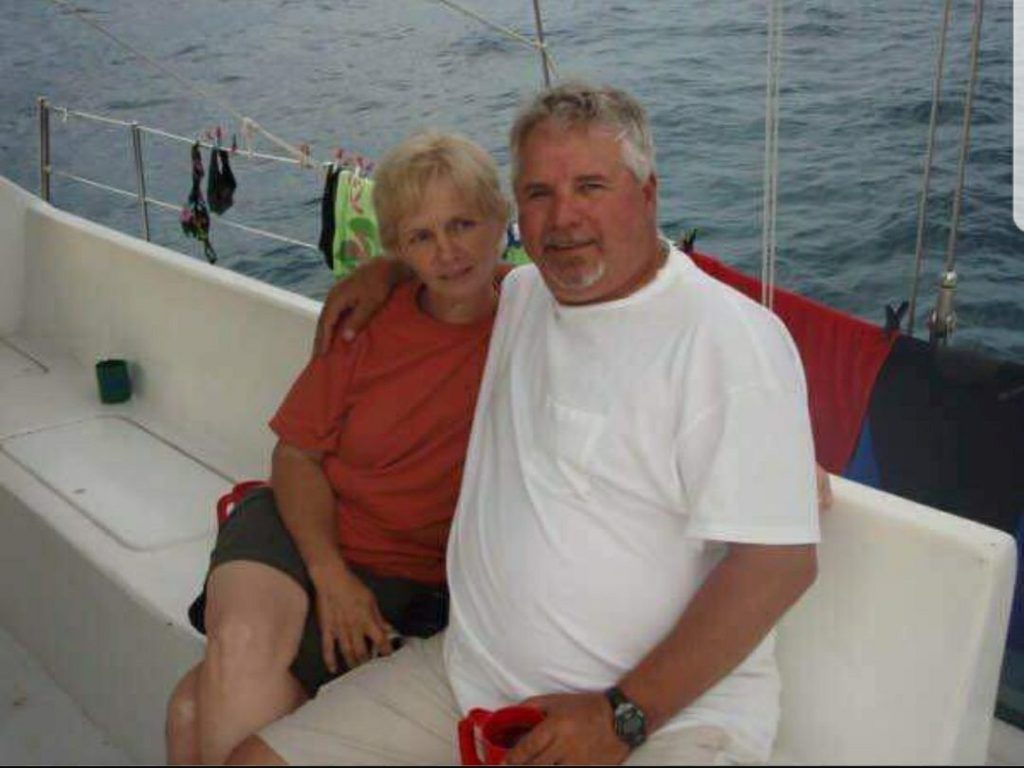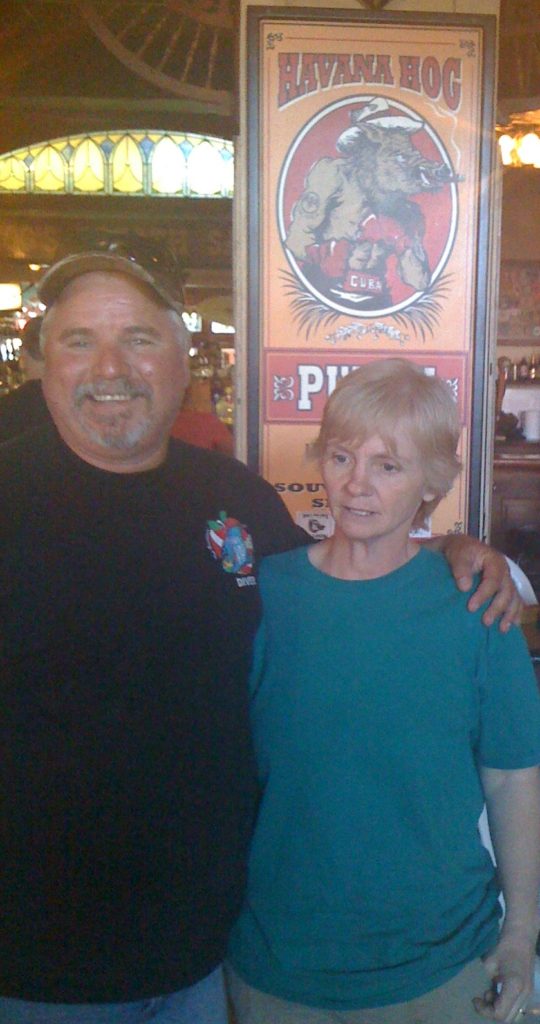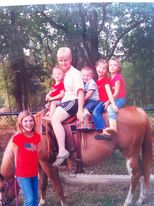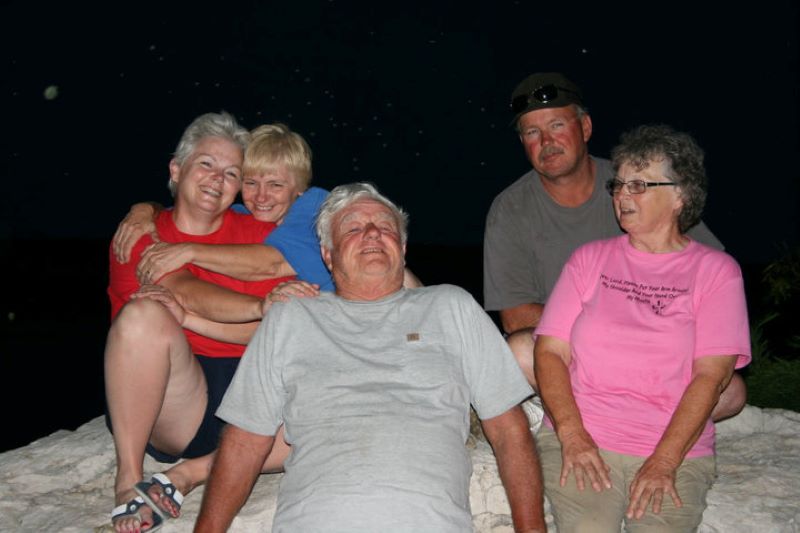So That Others Will Know
David & Patricia Ivie’s story
Part of the CO Experience Project series Posted 9-8-2023 by Lyrysa Smith

Date and location of poisoning: 8-24-2017, Best Western – Perryton, Texas
It was a trip like so many others before.
Parents to four children and grandparents to nine grandchildren, the Ivies were often on the move. Patricia, an equestrian, and David, a consultant to the oil industry in the big state of Texas and a competitive skeet shooter, the couple enjoyed a host of outdoor activities together, including travel.
On August 23, 2017, they left their home near Fort Worth and traveled to the Texas panhandle region for a family event. They checked into a Best Western in the town of Perryton and settled into Room 217, likely anticipating a normal, routine overnight hotel stay. However, this hotel stay would be far from normal or routine – and, within four months, their stay would cost both of them their lives. As their son, Buck Ivie, describes, “Since that day, our world was turned upside down and forever changed.”
The following morning, August 24th, a hotel housekeeper heard an alarm sounding in the Ivie’s room. She entered and found the room’s CO detector alarming and discovered Patricia in the bed and David near the bathroom face down on the floor – both were unconscious. They were transported to a nearby hospital where they were diagnosed with carbon monoxide (CO) poisoning. The hotel was evacuated and several other hotel guests and staff members were found to be sick from CO poisoning, requiring medical attention.
Buck recalls that his parents were airlifted, less than one hour later, to the larger Northwestern Hospital in Amarillo. “The doctors were pretty quick to test for CO because given the circumstances, it felt like it couldn’t be a lot of other things,” he says. “My parents had CO levels (or COHb) of 28%, and most likely higher than that before they were tested.”
The fire department responded to the hotel and found “substantial levels” of CO in areas of the hotel, most notably in the second-floor rooms. In a room just down the hall from the Ivie’s, the guests who had checked out that morning had taken the battery-powered CO alarm off the wall and placed it on the nightstand with a note stating that the alarm went off at 3:30am and 4:30am and added that the battery needed replacing.
It did not take long for investigators to find the source of the CO. Located directly below Room 217 was a utility room containing the pool heater, which was connected to a severely corroded exhaust vent pipe. Each time the pool’s heater would turn on, deadly CO gas would escape from these corroded pipes and flow into the guest rooms above.
Further investigation found the pool heater utility room also had an inoperable exterior exhaust fan and a boarded-up fresh air intake. Pool chemicals were found stored in the room, too, which contributed to the corrosion of the vent pipe. Subsequent air testing in Room 217 with the pool heater running showed CO levels steadily increasing and finally peaking at more than 1200 parts per million (ppm). (For comparison, the OSHA permissible exposure limit for CO is 50ppm. OSHA standards prohibit worker exposure to more than 50 parts of CO gas per million parts of air averaged during an 8-hour time period https://www.osha.gov/sites/default/files/publications/carbonmonoxide-factsheet.pdf.)
The Ivie’s case is unique amongst hotel CO incidents because the hotel did have CO alarms in the guest rooms per a Best Western requirement enacted in 2014. https://www.wsoctv.com/news/local/all-best-western-rooms-get-co-detectors-after-3-bo/113539223/
However, it is unclear when the alarm in Room 217 first sounded, if it continued to sound, and why it didn’t it sound in time to alert the Ivies to the lethal danger surrounding them or for the hotel staff to respond sooner.
Both Patricia and David survived the incident, initially, but it was just the start of a terrifying and horrible ordeal for the couple and their family, especially Buck and his wife, Terri.
From the beginning, and with this article, Buck has been determined to tell his family’s tragic story as often as possible. He insists on publicizing it so that others will be aware of the dangers of CO poisoning. “Our story, and any CO poisoning story still does not get enough attention,” Buck says, his soft voice now forceful. “Because CO poisonings just keep happening.”
Where were you when this happened? Did you get a call? What did you do?
I was at work in Midland (Texas), and got a call. I think it was my grandmother, and she told me. She said that my sister was already on the way. I went as quickly as I could to Amarillo and got there the next morning.
It was horrifying to see them at first. They were both intubated in the ICU, and on full life support. They both had bloated, swollen bodies, the tubes going in their mouths, they were both in a coma, wires coming out all over them… It was awful.
I’m so sorry. Hyperbaric oxygen (HBO) is frequently given to CO poisoned patients these days. Did your parents receive any HBO?
No, neither parent got HBO. Oklahoma City was the closest hospital with HBO, and that was a three-hour flight. Plus we were told that they couldn’t do HBO because my parents were already intubated. I don’t know about that.
Did you have some doubt if they would survive?
Absolutely, I wondered every day if they’d be there when I came to their rooms at the hospital. We were in Amarillo and at the hospital for 28 days total. My parents were alive but it was scary because the doctors told us that the first 48 hours would be uncertain because it takes time for the CO poison to leave, and it’s like another dose of it as the poison moves through the body and is released again. I know now that the CO was damaging their brains and all their organs. The doctor told me it’s always a guessing game. And the nurses – well, they were learning as they went along just like I was.
You mentioned your parents were each in a coma too. That’s scary. How long did their comas last?
My mother was nonresponsive until around day six or seven, and she just woke up. My Dad woke up all of sudden about 12 hours later.
Wow. How did it feel when they were awake and you knew they survived?
At that point, we were relieved. The fact that they woke up at all was incredible. We were told by all the doctors, that no one survives that level of CO poisoning.
Talk about those early days after they were awake.
At first, my mother seemed normal, except the right side of her face wasn’t working. My dad was much more normal and in control. I told him to not try to talk because had the intubation tube still, but he said, “Hell with that, I want a Coca-Cola.” That’s when I thought, OK, that’s him, that’s my dad, and he’s going to be just fine.
My mother needed lots of help. She couldn’t walk or feed herself. She had lots of PT and other therapies, but she never walked another step on her own again, and never fed herself again. Mentally, she reverted to being like a 5-year-old child in everything she did or said. She called everyone “Momma.”
It’s like she was a different person. That must have been very difficult for you.
Oh, yeah. And that was just the beginning. My mom declined fast. Before we left Amarillo, me and my sister and some family decided that this is her time. Both my parents lost their appetites and didn’t have any interest in eating. The doctor spoke to us about putting a feeding line in Mom and we said, “No, we’re not going to do that.” We agreed it was time to let her go. We chose to get hospice care for her. She was in hospice and she remained childlike. After about 18 days, she died, on October 18th, two months after the incident. (Patricia Ivie was 58.)
And your father, how was he? Was he also a very different person?
Yes, but my dad was still somewhat functional. He could walk and needed less physical help, but mentally, he quickly regressed to a 13- or 14-year-old. He’d seem aware sometimes and could have conversations, and then suddenly, he’d snap. He’d go off and become so strange and weird. He’d talk about flying planes, and trips to the Congo and snakes – and none of that was real. He thought the poisoning he had was because a snake bit him. He was like an Alzheimer’s patient. He’d have a good grasp of what’s happening, but then his hallucinations became wilder and more frequent and he became more and more violent. It was heartbreaking for me.
That’s so sad for you to witness his decline.
It was. We were trying our best. We decided he needed to go to the best medical doctors there are, so we took my dad to the Mayo Clinic in Minnesota. They basically told us he was too far gone and there was nothing that could be done to help him. We had Dad in memory care at couple different nursing homes. But he was difficult to care for because he was increasingly agitated, irritable, and aggressive.
Those are common symptoms of severe brain injury from CO poisoning. It’s hard to feel so helpless, isn’t it, and unable to stop your father’s decline?
It was horrifying. After losing my mom, it was two more months of torture, just witnessing my dad wither away. He lost 75 pounds, had those horrible hallucinations, and more memory loss. We brought him to our house and arranged hospice care. One time, he asked my wife, Terri, why they didn’t just let him die. It was proof that as difficult as the last weeks were for us, watching him deteriorate, he was also tortured mentally himself.
I know many family members face that difficult question.
Yeah. Really, it would have been better if my parents never woke up.
I understand. Do you want to say more?
I work in the oil and gas industry, as did my dad and my grandfather. We’ve been in this business for generations. I was always much closer to my dad; he was my hero. And I watched him go in a matter of days from a really kind, nice man, to being violent, racist, and mean.
As you know, this is a really important and underrecognized reality about CO poisoning that most people aren’t aware of at all – the ordeal and struggle for the family and loved ones of CO poisoning victims.
It’s true. It’s shocking, over and over again. Mom lived two months and Dad lived four months after they were poisoned. But they were never the same people. My dad died just before Christmas, December 22nd. (David Ivie was 62.)

The Ivies always enjoyed traveling together (photo courtesy of Buck Ivie)
After all of this, what’s the biggest mystery for you?
The biggest mystery is why they survived at all. That heavy lethal dose of CO poisoning? The medical staff said they should never wake up; that it was insane to imagine they would survive that and be responsive. And yet they did. They were both relatively healthy and active. I believe my mom’s case was worse though, because she had a couple of health issues that she took some medicines for. But my dad – he was healthy, he didn’t take anything.
Can you tell us a bit about the lawsuit you went through? Was it meaningful for you?
Our lawsuit was settled before the jury trial, but it was complicated because there were a number of parties involved and a lot of finger-pointing – the hotel, the heater company, pool company, on and on. It took about a year, which my attorney said was quick, and I guess that’s true.
And yes, it was meaningful because we insisted that our story, our case be very publicized. We are still very vocal and insisted that all records be public. We fought hard for that. We wanted our case to be used because we don’t want this to happen to others. Our attorney said, and I also believe, that we have made an impact, but want to have more.
Yes! Please tell me more about that.
There needs to be a national, forcible mandate. CO detectors should be legally required in every hotel room and regularly inspected and certified. They have to be maintained. They’re no good if they’re not working properly! We expected more from Best Western than just creating more policies, which may or may not be followed or done right. Hotels should be solving this problem. Electric motors for swimming pool heaters should be mandated, and corrosive chemicals in the same room as the heater equipment causes greater corrosion of pipes and it has to stop. Also, mandated regulations for CO detectors and maintaining them. They weren’t doing their jobs of testing CO detectors and making them safe. No proper procedure was followed.
As you went through all of this, what resources did you have or wish you had?
We didn’t have many resources for anything. And we tried. But practically no one knows about CO poisoning. We could have used and I really wanted more information that would have helped us. It was hard on all of us – all four of my parents’ kids, and their nine grandkids, and even their parents had to watch their children die. One family member had such mental stress in part due to losing his parents so fast and in the way that they died… well, he’s really just gone crazy. Even all the doctors and nurses we worked with didn’t have much experience with CO poisoning. There’s just not a lot of information out there to be had, especially for survivors and their families.

Patricia Ivie and her grandchildren (photo courtesy of Buck Ivie)
What do you want others to know that people don’t understand?
You better take care of yourself because no one else will. No one thinks about it. They can know about my story or other CO poisoning events, but no one really thinks about it.
This is 100% preventable. Me and my family all travel with portable CO detectors now, everywhere we go. Several family members have had their detectors go off. One family member and her fiancé were in a rental apartment and the hot water heater was broken. Her CO alarm saved their lives.
Buck and Terri continue to write to their legislators, share their family’s story, and ask for CO protection legislation. They’ve only received standard responses so far, but Buck says he’s not giving up. “I’m going to continue to push. Because I know …,” he pauses. And then adds, “And I have to tell others.”

Patricia Ivie (in blue, second from left) with her siblings and parents
Follow us on Facebook or sign up to receive email updates for notification of future posts in this series


